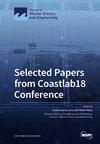Deep Learning Based Characterization of Cold-Water Coral Habitat at Central Cantabrian Natura 2000 Sites Using YOLOv8
IF 2.8
3区 地球科学
Q1 ENGINEERING, MARINE
引用次数: 0
Abstract
Cold-water coral (CWC) reefs, such as those formed by Desmophyllum pertusum and Madrepora oculata, are vital yet vulnerable marine ecosystems (VMEs). The need for accurate and efficient monitoring of these habitats has driven the exploration of innovative approaches. This study presents a novel application of the YOLOv8l-seg deep learning model for the automated detection and segmentation of these key CWC species in underwater imagery. The model was trained and validated on images collected at two Natura 2000 sites in the Cantabrian Sea: the Avilés Canyon System (ACS) and El Cachucho Seamount (CSM). Results demonstrate the model’s high accuracy in identifying and delineating individual coral colonies, enabling the assessment of coral cover and spatial distribution. The study revealed significant variability in coral cover between and within the study areas, highlighting the patchy nature of CWC habitats. Three distinct coral community groups were identified based on percentage coverage composition and abundance, with the highest coral cover group being located exclusively in the La Gaviera canyon head within the ACS. This research underscores the potential of deep learning models for efficient and accurate monitoring of VMEs, facilitating the acquisition of high-resolution data essential for understanding CWC distribution, abundance, and community structure, and ultimately contributing to the development of effective conservation strategies.使用 YOLOv8 对坎塔布里亚中部自然保护 2000 遗址的冷水珊瑚栖息地进行基于深度学习的特征描述
冷水珊瑚(CWC)礁,如由百叶藻(Desmophyllum pertusum)和眼珠母藻(Madrepora oculata)形成的珊瑚礁,是重要而脆弱的海洋生态系统(VMEs)。对这些栖息地进行准确、高效监测的需求推动了对创新方法的探索。本研究介绍了 YOLOv8l-seg 深度学习模型在水下图像中自动检测和分割这些关键 CWC 物种的新应用。该模型在坎塔布里亚海的两个自然保护 2000 遗址(阿维莱斯峡谷系统(ACS)和卡丘乔海山(CSM))收集的图像上进行了训练和验证。结果表明,该模型在识别和划分单个珊瑚群方面具有很高的准确性,能够评估珊瑚的覆盖率和空间分布。研究显示,研究区域之间和内部的珊瑚覆盖率存在很大差异,凸显了珊瑚礁公约栖息地的零散性。根据覆盖率组成和丰度确定了三个不同的珊瑚群落组,其中珊瑚覆盖率最高的珊瑚群落组仅位于 ACS 内的 La Gaviera 峡谷头。这项研究强调了深度学习模型在高效、准确地监测脆弱海洋生态系统方面的潜力,有助于获取对了解 CWC 的分布、丰度和群落结构至关重要的高分辨率数据,最终有助于制定有效的保护战略。
本文章由计算机程序翻译,如有差异,请以英文原文为准。
求助全文
约1分钟内获得全文
求助全文
来源期刊

Journal of Marine Science and Engineering
Engineering-Ocean Engineering
CiteScore
4.40
自引率
20.70%
发文量
1640
审稿时长
18.09 days
期刊介绍:
Journal of Marine Science and Engineering (JMSE; ISSN 2077-1312) is an international, peer-reviewed open access journal which provides an advanced forum for studies related to marine science and engineering. It publishes reviews, research papers and communications. Our aim is to encourage scientists to publish their experimental and theoretical results in as much detail as possible. There is no restriction on the length of the papers. The full experimental details must be provided so that the results can be reproduced. Electronic files and software regarding the full details of the calculation or experimental procedure, if unable to be published in a normal way, can be deposited as supplementary electronic material.
 求助内容:
求助内容: 应助结果提醒方式:
应助结果提醒方式:


